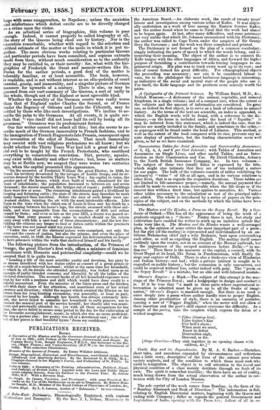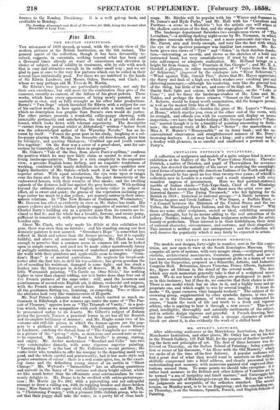PUBLICATIONS RECEIVED.
Boons.
A Narrative of the Mission sent by the Governor-General of India to the Court of Ave in 1855; with Notices of the Country, Government, and People. By Captain Henry Yule, Bengal Engineers, P.R.G.S., late Secretary to the En- voy, (Major Phayre,) and Under-Secretary (D.P.W.) to the Government of India. With numerous Illustrations.
Memoirs of the Queens of Prussia. By Emma Willsher Atkinson. Essays, Biographical, Historical, and Miscellaneous, contributed chiefly to the Edinburgh and Quarterly Reviews. By the Reverend G. R. Gleig, M.A., Chaplain-General to her Majesty's Forces, and Prebendary of St. Paul's. In two volumes.
India in 1858: a Summary of the Existing Administration, Political, Fiscal, and Judicial, of British India ; together with the Laws and Public Docu- ments relating thereto, from the Earliest to the Present Time. By Arthur Mills, M.P. With a Revenue Map. 0/4 Cough, its Causes, Varieties, and Treatment ; with some Practical Re- marks on the Use of the Stethoscope as an aid to Diagnosis. By Robert Hun- ter Semple, M.D., Member of the Royal College of Physicians of London, &c, Gaston Bligh. By L. S. Lavenu, Author of " Erlesmere." In two volumes.
A Zulu-Kafir Dictionary, Etymologically Explained, with copious 1-12ustrations and Examples. By the Rev. T. L. Dohne, Missionary to the American Board.—An elaborate work, the result of twenty years' labour and investigation among various tribes of Kalil's. It was origin- ally undertaken as a work of love among the Eastern frontier Kafirs, and the author found when he came to Natal that the work had almost to be begun again. At last, after many difficulties, and some patronage not very unlike that which Dr. Johnson encountered with his Dictionary, the author was called to Cape Town under the auspices of Sir George Grey the Governor ; and the work was there completed and printed. The Dictionary is not formed on the plan of a common vocabulary, simply indicating the parts of speech to which the words belong, and in- terpreting their meaning. The object of the author is to connect the Kafir tongue with the other languages of Africa, and forward the higher purpose of furnishing a contribution towards tracing languages to one primfeval origin. His plan was to track every word up to its root ; and this of course formed his great difficulty. For ethnographical objects the proceeding was necessary ; nor can it be considered labour in vain, for to the philologist the most barbarous language is interesting, as indicative of the social and mental state of the people who use it. For itself, the Kafir language and its products seem scarcely worth the pains.
The sole reprint of the week comes from Bombay, in the form of the " Bombay .Almanack and Book of Direction." The information is full, relating to English Directorial matters, beginning with the Queen and ending with Company ; fuller as regards the general Government and Legislation of India, opening with the Press Act; fullest of all in re- A Cyclopedia of the Natural Sciences. By William Baird, M.D., British Museum.—A dictionary of the animal, vegetable, and mineral kingdoms, in a single volume ; and of a compact size, when the extent of the subjects and the amount of information are considered. Its great urn, as indeed its first object, is to serve as a book of reference in natural history. As the terms of the text are scientific, an index is appended, in which the English words will be found, with a reference to the dic- tinnery,—as the horse is included under the head of " Equidie." It may be inferred from this statement, which is indeed the ease. that the species are mostly included in the family, and sometimes in the order,— - as asparagus will be found under the head of Liliacem. This method, as well as the extent of the book compared with its size, prevents any mi- nute display of particulars, but the leading characteristics seem well given, so far as we have examined.
- Commutation Tables for Joint Annuities and Survivorship Assurances, at 3, 3, 4, 5, and 6 per Cent Interest; with Tables of Annuities and Assurances on Single Lives, and other useful Tables, and an Intro- duction on their Construction and Use. By David Chisholm, Actuary to the North British Insurance Company, &c. In two volumes.— The subject of these two (small) folios is expressed by the title, which might also intimate that they are of too technical a nature for our pages. The bulk of the volumes consists of tables exhibiting the (actuary's) "value " of life at all ages, and in its various relations to other lives, that is as regards the respective durations. These tables are not limited to life-assurance proper,—namely, the annual payment that should be made to secure a sum receivable when the life drops or if the insurer dies within a fixed time, but applies to annuities, &c.' Various other tables necessary to the calculation- or test of the principal tables are added. The whole is introduced by a series of papers on the prin- ciples of the subject, and on the methods by which the tables have been constructed.
The Moslem and the Hindoo, a _Poem on the Sepoy Revolt. By a Gra- duate of Oxford.—This has all the appearance of being the work of is graduate engaged on a " theme." Poalry there is not, but study and cultivation have enabled the writer to 4vbrk up an imitative article that looks 'very like it. The Moslem and the Hindoo wants a well-arranged ' plan, ie. the opinion of some critics the most important part of a poem ; but the plot (of the mutiny) is represented and individualized by an am- bitious Mahometan chief and a wily Brahmin, bent upon overreaching each other, as well as expelling the English. The mutiny itself comes suddenly upon the reader, not in an account of the Meerut outbreak, but in the appearance of the escaped mutineers before Delhi—" in me- dies res." Then there is the massacre at the capital, a council, with the Great Mogul at its head, like Satan in Pandemonium, with finally the siege and capture of Delhi. There is also a birds-eye view of Hindost,an and Indian history—not bad ; while a private interest is sought to be engrafted on public history ; but the connexion is only concurrent, and could be removed without loss, rather indeed with gain. The "poem on the Sepoy Revolt " is a mistake, but an able and well-labournd mistake.
Oberon's Empire : a Mask.—The subject of this attempt is the mar- riage of the Princess Royal; and a hodgepodge in design and conduct it is. If it be true that " a mask in those parts where supernatural in- tervention is admitted must be given up to all the freaks of imagi- nation," Oberon'e Empire is maskish enough. But there is no need to enter deeply into a poem whose author hardly rises to proper English. Among other peculiarities of style, there is an omission of particles, causing a sort of "Nigger English," when the metre will not allow of their insertion and the poet's skill cannot overcome the difficulty. As a sample of the poetry, take the couplets which express the doom of a wicked magician.
"Fine (kissing him). False traitor's kiss O'er hell's abyss ; When next we meet, Know in defeat Destruction nigh, Descend, or die.
[Stage direction—They sink together in an opening chasm with caldron, &c.] " Castle Rag and its Dependencies. By M. A. S. Barber.—Sketches, short tales, and anecdotes expanded by circumstances and reflections into a little story, descriptive of the lives of the outcast poor whom society neglects, and of the condition to which those must sink who yield to temptation. The object is to call attention to the moral and physical condition of a class mainly destitute through no fault of its own. The spirit is somewhat tra.ctlike ' - the facts have an air of reality, Much being drawn from the actual observation of the author in con- nexion with the City of London Mission.
ference to the Bombay Presidency. It is a well got-up book, and creditable to Bombay.
The Bombay Alnianaak and Book of Direction for 1858, being the Second after Bissextile or Leap Year.



































 Previous page
Previous page